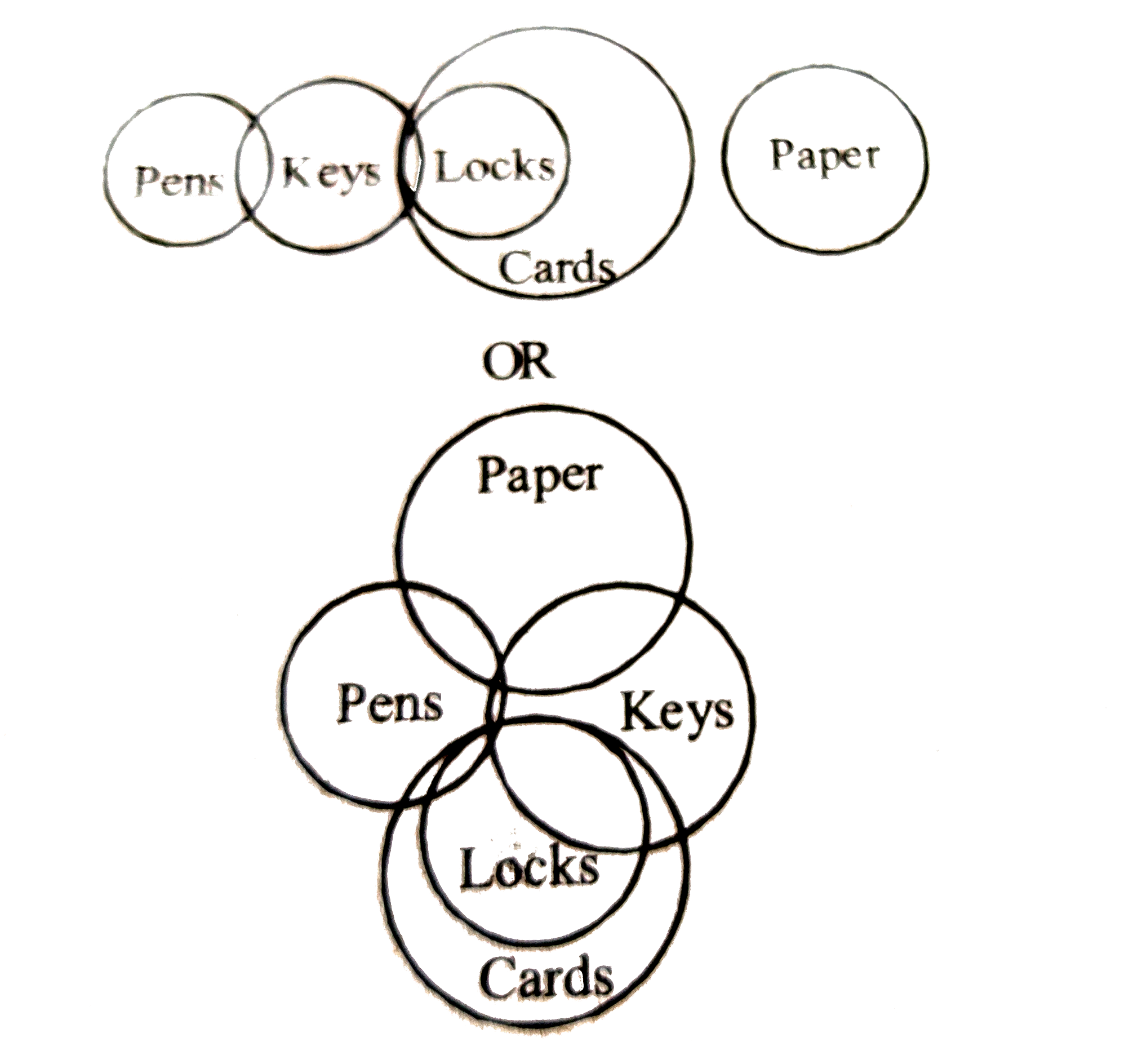Statements: Some pens are keys. Some keys are locks. All locks are cards. No card is Paper
Conclusions:
I. No lock is paper
II. Some cards are keys
III. Some keys are not paper
I and II follow
Only I follows
Only II follows
All follow
The correct Answer is:D
According to question

Conclusion I : True
II. True
III. True
Hence, All conclusion Follow
Topper's Solved these Questions
Similar Questions
Directions: In the question below are given three statements followed by three conclusions numbered I,II and III. You have to take the given statements to be true even if they seem to be at variance with commonly known facts. Read all the conclusions and then decide which of the given conclusions logically follows from the given statements, disregarding commonly known facts.
Statements: Some keys are locks.
All locks are doors.
Some doors are windows.
Conclusions: I. All keys are locks .
II. Some doors are locks.
III. No window is a key.
1] Only I follows
2)Only II follows
3) Only eithers I or III and II follow
4) only either I OR III follows
5) None of these
View SolutionStatements:
Some petals are flowers
All flowers are desks
Some desks are cards
All cards are trains
Conclusions:
I. Some desks are flowers
II. Some desks are petals
III. Some petals are cards
IV some desks are trains
View Solution
Knowledge Check
DIRECTIONS : In the question below are given few statements followed by few conclusion. You have to take the given statements to be true even if they seem to be at variance with the commonly known facts and then decide which of the given conclusions logically follows from the given statements, disregarding commonly known facts.
Statements :
Some papers are keys.
Some keys are locks.
All locks are cards.
No card is paper.
Conclusions :
I. No lock is paper.
II. Some cards are keys.
III. All cards are keys.ANone followsBOnly I or II followsCOnly I followsDOnly II followsDIRECTIONS : In the question below are given few statements followed by few conclusion. You have to take the given statements to be true even if they seem to be at variance with the commonly know facts and then decide which of the given conclusions logically follows from the given statements, disregarding commonly known facts.
Statements :
some gates are keys
Some keys are locks
All locks are woods.
No wood is gate.
Conclusions :
I. No lock is gate.
II. Some woods are keys.
III. Some keys are not gate.ANone followsBOnly I and II followCOnly I followsDOnly II followsStatements:
Some blades are papers
Some papers are books
Some books are pens
Conclusions:
I. Some pens are papers
II. Some books are blades
III. Some pens are blades.AOnly I followsBOnly II followsCOnly I and III followsDOnly I and II follow
Statements: All locks are keys.
No key is a spoon.
Conclusions: I No lock is a spoon
II No spoon is a lock.
View SolutionStatements: a Some books are bulbs.
b All biscuits are pens.
c. No bulb is a biscuit.
Conclusions: I Some books are not biscuits.
Some bulbs are not pens.
III Some books are not pens.
IV Some pens are not bulbs.
View SolutionStatements:
Some mobils are pens
Some pens are covers
Some covers are plates
All plates are papers
Conclusions:
I. All mobilesa re covers
II Some pens are papers
III. All plates are mobiles
IV. Some papers are mobiles
View SolutionStatements: a. Some papers are nibs.
b No fIIe is a cutter.
c. Some fIIes are papers.
Conclusions: I Some fIIes are nibs.
II Some papers are cutters.
III Some fIIes are not nibs.
IV. Some papers are not cutters.
View SolutionRead the statements and select a conclusion from the given alternatives:
Statements:
All pensare pencils. Some pencils are erasers. Some erasers are ropes. All ropes are tents
Conclusions:
I. Some tents are trams
II. Some ropes are pens
III. Some erasers are pens
IV. Some pencils are pens.
View Solution
